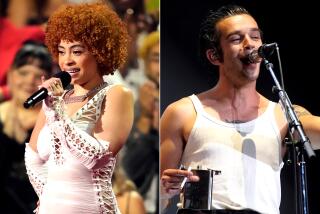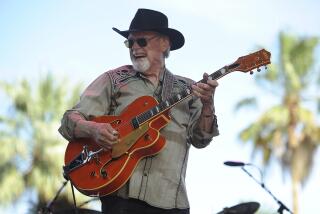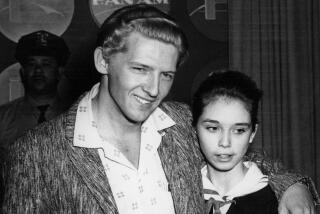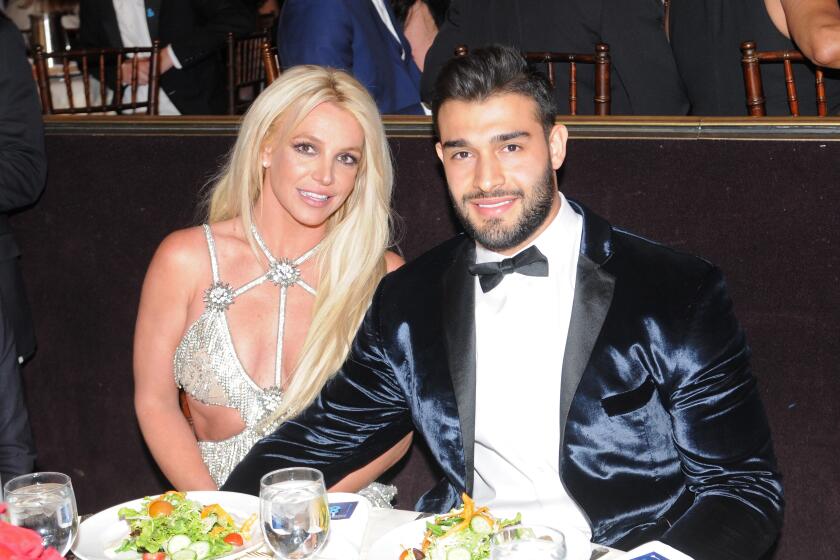Inclusive hip-hop is Common
Chicago rapper Common considers it a good omen that he bumped into Queens rhymer 50 Cent on a recent airplane flight. The rappers are virtual poster children for genres of hip-hop that typically sit at opposite ends of the spectrum: gangsta (50) versus culturally “conscious” (Common), low- versus highbrow, crudely commercial versus artistic and elitist.
Far from generating any heated exchanges or even awkward silences, their encounter was amicable. “50 and I shook hands,” Common says, “and he was like, ‘Man, I love your stuff.’ ”
The rapper tells this story and says the time is ripe for his new album, “Be,” slated for release today. “The walls of genre are being broken down,” he says, smiling serenely and sipping from a bottle of Smartwater in the New York offices of Geffen Records.
“It’s cool for a street dude to like [socially] conscious rap now. And it’s OK if, say, John Mayer is on one of my tracks. It ain’t like, ‘Oh, why’d he get this white cat who’s from a whole other style of music?’ People don’t think like that anymore.”
Common attributes this shift to the influence of one person, who also happens to be executive producer of “Be”: Kanye West.
By lending his production skills to a wide array of artists -- from Maroon5 to John Legend to the Game -- West helped musical worlds find common ground. And by refusing to anchor himself to a single hip-hop persona, West attested that art and commerce, uptown and downtown, need not be mutually exclusive.
“Kanye was able to say, ‘I like conscious rap and I like the street stuff,’ and ‘I want to get paid and I want to wear jewels, but hey, here’s a song about God,’ ” says Common.
Those were lessons Common says he needed to learn. “Be” is his sixth album, and he was nominated for a Grammy in 2001, but the 33-year-old rapper has never quite found a home in the mainstream music world. That was, in part, because he never cared to: His work has been aimed at the indie-rap scene.
But the new album -- steeped in West’s signature retro-soul samples, lyric-centered but musically alluring -- is accessible enough to introduce Common to a broader audience. Heralded as a classic by several hip-hop magazines, “Be,” co-released by Geffen and West’s GOOD Music label, establishes Common and West as a formidable duo, on par with Snoop Dogg and Dr. Dre, or Missy Elliott and Timbaland.
“This album, for me, is a return to the roots, to home,” says Common, who moved from Chicago to Brooklyn, N.Y., in 1998. “Home is me being grounded in who I am. And home is returning to Chicago a lot and absorbing life and writing about it. And home is a return to traditional hip-hop, which is the raw, soulful boom-bap drums, sampled music with clever rhymes.”
Among the high points of “Be,” says Common, was collaborating with spoken-word luminaries the Last Poets on “The Corner,” the album’s first single. Lyrically and musically, it’s steeped in old-school nostalgia, but it has all the head-nodding vibrancy of a contemporary hit.
Common and West’s working relationship began in Los Angeles more than a year ago, when West invited Common to visit him in the studio. Common arrived to find West finishing up a beat for another artist.
“Kanye was looking at me like, ‘I know you want this beat,’ ” Common recalls. “And I’m like, ‘Yeah, I want it.’ And he’s like, ‘Quick, put it on CD before the artist gets here, and take it.’ ”
The beat became “The Food,” a rousing collaboration that Common and West performed on “Chappelle’s Show” last year -- thereby launching the buzz about “Be.”
But seeds for the Common-West union were really planted in Chicago in 1996, at an emcee battle. Common, born Lonnie Rashied Lynn and initially known by the moniker Common Sense, was the city’s most successful rapper; with two independent albums, he had made his name following in the footsteps of the early-’90s Afrocentric, spiritually minded “Native Tongues” rap movement, which included such acts as A Tribe Called Quest and De La Soul.
Among the would-be rappers Common encountered in Chicago during those years was a “hungry, young, enthusiastic, confident type of dude” named Kanye, who challenged him to a battle. That battle was broadcast on college radio -- and there is no unanimous decision as to the winner.
But the two Chicago artists set off on divergent career paths. As West worked his way up the Roc-a-Fella Records ladder, Common became known as the uber-conscious lyricist whose 1997 album, “One Day It’ll All Make Sense,” tackled such subjects as abortion (“Retrospect for Life,” a collaboration with Lauryn Hill) and spirituality (“G.O.D. [Gaining One’s Definition],” with Cee-Lo).
With his auspicious 1994 meta-rap “I Used to Love H.E.R.,” Common also earned a reputation as a clever but curmudgeonly critic of hip-hop. The allegorical song, in which hip-hop is personified as a beautiful woman corrupted by materialism, eventually became the inspiration for “Brown Sugar,” the 2002 hip-hop nostalgia film starring Taye Diggs.
In an odd turn of events, the track also is cited as a trigger for the East Coast-versus-West Coast gangsta-rap feud. Lyrics from the song -- about hip-hop moving to L.A. and becoming “a gangsta rollin’ with gangsta [expletive]” -- were read by Ice Cube as “disses” aimed at gangsta rap and its birthplace; on Inglewood rapper Mack 10’s track “Westside Slaughterhouse,” Cube crudely fired back at the East Coast, and the rest snowballed into rap history. In retrospect, Common, who says he always “had love” for both coasts, finds the whole scenario absurd. “If Ice Cube only knew that I was one of his biggest followers,” he says with a laugh.
Common’s 2000 album, “Like Water for Chocolate,” was his most commercially successful. Featuring collaborations with Mos Def, Femi Kuti and jazz trumpeter Roy Hargrove, it earned a Grammy nomination in the rap category for its reverent, new-age love song, “The Light.”
But the album’s 2002 follow-up, “Electric Circus,” was too eccentric and avant-garde for the mainstream. So, too, were the cadre of artists with whom Common aligned himself: What became known as the “Soulquarians” movement included Common, D’Angelo, the Roots and Erykah Badu -- whom Common dated for several years (“She was God-sent for those two years,” he says, “but it had to end.”)
“We captured our scene musically, but ... we never reached out to other audiences -- we stayed in our little circle,” Common says of his Soulquarian days. During those years, he continues, “commercial” was practically an expletive. He recalls being asked to star in a Coca-Cola ad and eventually saying yes -- but only after weeks of agonizing about potentially “selling out.”
Nowadays, Common says he wouldn’t agonize; West has helped him conquer angst about being artistic and commercial.
West has also, he says, taught him to not fear self-promotion, to consider “bringing in other crowds” with his music and to develop “an appreciation for everyone’s style of hip-hop, even if it’s not to my taste.” In other words, the rapper who once lamented hip-hop’s degeneration now feels “really good about where hip-hop is at right now.”
By launching Soji, a high-end hat line, Common is pursuing a business plan that he never would have taken on just a few years ago. And for his playful new single “Go,” on which John Mayer sings the hook, he’s just shot a sexy video -- in which ankhs and incense have been replaced by models and bedspreads.
“We can’t be limited to being just one thing; we’re human,” Common says. “I’m conscious, I’m aware, I’m a spiritual being -- but I’m also a sexual being. And yes, all those things can coexist.”
More to Read
The biggest entertainment stories
Get our big stories about Hollywood, film, television, music, arts, culture and more right in your inbox as soon as they publish.
You may occasionally receive promotional content from the Los Angeles Times.






